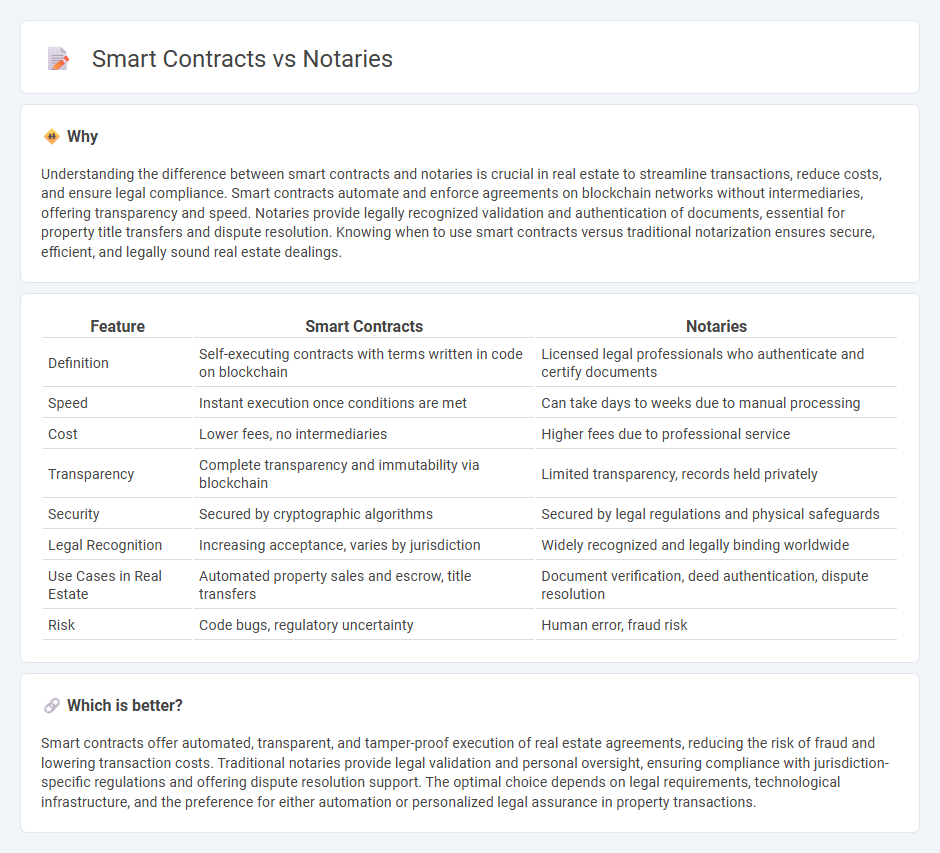
Smart contracts utilize blockchain technology to automate and securely execute real estate transactions, eliminating the need for traditional manual processes managed by notaries. Notaries provide legal validation and authentication of documents, but smart contracts offer increased transparency, speed, and reduced costs in property dealings. Explore how these innovations reshape trust and efficiency in real estate transactions.
Why it is important
Understanding the difference between smart contracts and notaries is crucial in real estate to streamline transactions, reduce costs, and ensure legal compliance. Smart contracts automate and enforce agreements on blockchain networks without intermediaries, offering transparency and speed. Notaries provide legally recognized validation and authentication of documents, essential for property title transfers and dispute resolution. Knowing when to use smart contracts versus traditional notarization ensures secure, efficient, and legally sound real estate dealings.
Comparison Table
| Feature | Smart Contracts | Notaries |
|---|---|---|
| Definition | Self-executing contracts with terms written in code on blockchain | Licensed legal professionals who authenticate and certify documents |
| Speed | Instant execution once conditions are met | Can take days to weeks due to manual processing |
| Cost | Lower fees, no intermediaries | Higher fees due to professional service |
| Transparency | Complete transparency and immutability via blockchain | Limited transparency, records held privately |
| Security | Secured by cryptographic algorithms | Secured by legal regulations and physical safeguards |
| Legal Recognition | Increasing acceptance, varies by jurisdiction | Widely recognized and legally binding worldwide |
| Use Cases in Real Estate | Automated property sales and escrow, title transfers | Document verification, deed authentication, dispute resolution |
| Risk | Code bugs, regulatory uncertainty | Human error, fraud risk |
Which is better?
Smart contracts offer automated, transparent, and tamper-proof execution of real estate agreements, reducing the risk of fraud and lowering transaction costs. Traditional notaries provide legal validation and personal oversight, ensuring compliance with jurisdiction-specific regulations and offering dispute resolution support. The optimal choice depends on legal requirements, technological infrastructure, and the preference for either automation or personalized legal assurance in property transactions.
Connection
Smart contracts automate real estate transactions by securely executing terms without intermediaries, ensuring transparency and efficiency. Notaries authenticate property deeds and verify identities, providing legal validation to smart contracts in real estate deals. Integrating notaries with blockchain technology enhances trust and reduces fraud in property transfers.
Key Terms
Authentication
Notaries provide authentication by verifying identities and witnessing document signings, ensuring legal validity through a trusted third party. Smart contracts utilize blockchain technology to authenticate transactions automatically via cryptographic proofs, eliminating the need for intermediaries. Explore how these authentication methods differ in security, efficiency, and legal recognition.
Automation
Notaries provide trusted certification and verification services for legal documents, leveraging human oversight to ensure authenticity and prevent fraud. Smart contracts automate transaction execution through blockchain technology, eliminating intermediaries and enabling self-enforcing agreements with predefined conditions. Explore the transformative impact of automation in legal processes by learning more about how these technologies compare and complement each other.
Immutable Ledger
Notaries provide trusted, legally recognized certification by recording documents on an immutable ledger, ensuring authenticity and preventing tampering over time. Smart contracts utilize blockchain technology to automatically execute and verify agreements with transparency and immutability, removing the need for intermediaries. Explore deeper insights into how immutable ledgers transform verification and contractual trust in today's digital landscape.
Source and External Links
Notary public - Wikipedia - A notary public is a public official who serves the public as a witness for signatures and authenticates the execution of various documents to help deter fraud.
What is a Notary Public? | NNA - A Notary Public is a state-appointed, impartial witness who verifies identities, witnesses signatures, and administers oaths to ensure proper execution of important legal documents.
Notary Services at The UPS Store - You can get documents notarized at many UPS Store locations, but call ahead to confirm availability and note that some document types (like wills and I-9s) may not be notarized there.
 dowidth.com
dowidth.com